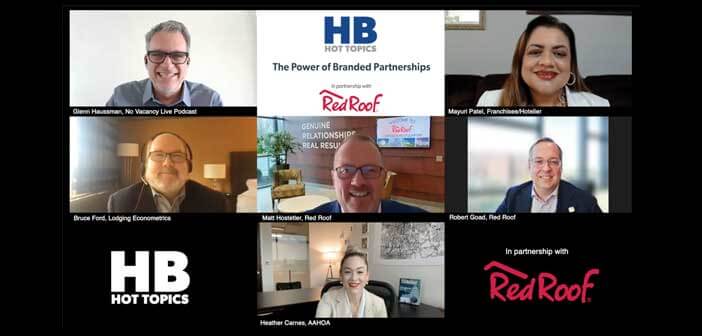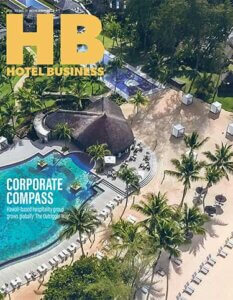Finding the right partner in business—and in life—can mean the difference between success and failure. In the hotel industry, choosing the right brand partner can be crucial in building an operation that is both profitable and less challenging to run.
The right brand can offer an owner initiatives and policies that can make or break a hotel. To help owners understand what they need to know, Glenn Haussman, founder/host, No Vacancy Live podcast, moderated a recent Hotel Business Hot Topics session, “The Power of Branded Partnerships,” sponsored by Red Roof.
The panel featured Heather Carnes, EVP, communications and chief strategy officer, AAHOA; Bruce Ford, SVP, director of global business development, Lodging Econometrics; Robert Goad, SVP, revenue strategy, Red Roof; Matt Hostetler, chief development officer, Red Roof; and Mayuri Patel, a hotelier and franchisee.
“Brand value is everything, especially when you are in a franchise world,” said Hostetler.
Finding the right flag has become even more difficult in recent years as Ford noted that branding has hit a “big revolution” with 147 new brands launched or premiering new products in the U.S. since 2016.
“That is an unprecedented growth curve that has sustained through the pandemic,” he said. “It’s not at the pace that it was pre-pandemic, but we are still seeing new brands.”
He continued, “Many companies are continuing to try and spread their wings through their value proposition, offering multiple chain scales and product types and continuing to leverage not just the business-to-business relationship, but the business-to-consumer relationship, which is unique out there in the business today.”
Carnes said that what her organization hears most from its 20,000 members is that the most important aspect is relationships.
“We know the hospitality industry is built on relationships, but when it comes to finding the right brand partner and really choosing who they’re going to do business with, it is strong relationships,” she said. “It is knowing that you have a brand that’s going to be supportive of you as a unique and individual entrepreneur, and really encouraging and lighting the flame for those entrepreneurs to pursue their dreams.”
Patel said that communication—especially when it is readily available—is key.
“It is important as a franchisee because if you have a problem, you want somebody to be able to assist you,” said the hotelier. “If you don’t have that, you’re not going to be able to succeed in the franchise environment.”
Hostetler agreed. “The more we listen to our franchise customer, the better off we are,” he said. “It is really about working with our franchisees and [addressing]their needs. It is important for us to connect internally—whether it be revenue management, operations, design or construction—all of these various tools that come along with our people to help them succeed.”
Goad said that his work in revenue optimization is a benefit that provides hotel owners with a major advantage versus working on their own. “We really dive as deep as we can for our franchise owners, finding ways to take away some of those responsibilities that can be easily overlooked or forgotten,” he said. “When you’re standing at the front desk, there are so many distractions from your customers, who you should be focused on at that time.”
Brands should make sure that they treat each owner differently because each one is unique, said Carnes, adding, “They are at different stages of their entrepreneurial journey, Someone coming into the market will have very different needs than hoteliers who are decades into their career. We are seeing this now with second- and third-generation hotel owners. Their needs are completely different from what their parents’ needs were a few generations ago. [Brands need to make sure] that they have a tool in their toolkit for every single issue that they are going to need to solve.”
Technology solutions
With the vast resources brand companies have, Haussman asked the participants how brands can help owners with challenges they face.
Lodging Econometrics’ Ford immediately went to technology. “The difference in the way we can function post-pandemic is really going to be pretty revolutionary in the business,” he said. “We said 10 years ago, ‘I wish we could tech out the hotel rooms and front desk more.’ The pandemic brought a lot of that to bear simply because jobs could no longer exist at the property level. They needed to be optimized and available online.”
Technology is moving at such a pace that it is hard for individual businesses to keep up. “The acceleration of technology and AI is really happening at a pace that we’ve never seen before,” said Ford.
Revenue expert Goad said that technology is going to change the way that the industry looks at, manages and changes prices on a day-to-day basis, as well as distribution costs. “What we can do to help lower costs for our owners, partners and franchisees is at the forefront of anything we do any given day,” he said.
Patel said that the brands can help owners figure out the technology they need. “As an owner, you don’t have time to figure this stuff out,” she said. “What I understand may be different than what my father might understand. If you don’t grasp it, it’s not going to work for you.”
She noted that consumers are reaching hotels differently than they used to. Brands are now using technology to reach a new generation of customers on apps like TikTok and Instagram.
With laws differing from state to state when it comes to what is allowed, Patel—a multistate property owner herself—noted that the brand can keep track of things.
“I can’t keep track of every law in every state,” she said. “They are looking at what’s good universally across the states and then what works individually in your state.”
While some hoteliers enjoy all the benefits of a brand, some more independent-minded owners choose soft brands because they want some of the benefits of a brand without all the strings attached.
“It’s a cultural shift,” said Ford, who said nearly 30 soft brands have premiered in the last eight years. “When I go to Nashville, I want to feel like my hotel says ‘Nashville,’ not necessarily whatever brand it is above the door. So I want it to be localized and designed in a local way and feel like it operates in a local way.”
Belonging to a soft brand allows the owner several advantages. “[It offers] the owner greater flexibility through technology to be able to offer a non-traditional-looking product, but yet a reservation system that can put it through a traditional booking process,” said Ford.
Soft brands also give hoteliers to flex their “innovative muscle to make something that feels like their own,” said Carnes. “You are meeting the demands of customers, while also being able to have that extra creativity to localize your product and make it into something that is unique and only to you. It really checks a lot of boxes.”
Labor and DEI
With the current labor situation across the country, owners can turn to the brands to help take some of the burden off the properties by handling certain tasks.
For example, like other brands, Goad said that Red Roof has tools that can help owners. “Our revenue management program is incredibly successful, but in addition to that, with RediSales, we bring in some of the top talent across the country,” he said. “It doesn’t have to be someone in the local market providing that local sales assistance. We can bring the ‘best of the best’ in at the brand level and help properties as they need it through the course of the year.”
Brands has also been quite active in the diversity, equality and inclusion (DEI) area, with programs such as Red Roof’s RIDE (Road to Inclusivity and Diversity in Entrepreneurship) and the recently rebranded SHE (Support, Help and Elevate) program for female entrepreneurs.
“There’s no question that there’s going to continue to be more opportunity to expand the DEI programs in the hotel business,” said Ford.
“The [Red Roof] team and other brands as well have been instrumental in helping to propel women and diversity,” said Patel.
Key takeaways
When asked for takeaways from the session, Carnes stressed the importance of relationships. “There’s really something about not feeling like you’re a number in a system—that you are recognized for the unique individual and entrepreneur that you are,” she said. “That is something that we have to continue embracing as an industry. How do we let them blossom as an entrepreneur and be able to make these creative decisions for their businesses while really leaning into those relationships?”
Hotelier Patel stressed that owners should do their due diligence to make sure that the brand is a good fit. “Take advice from people who are already in the system,” she said. “Call somebody you know because working with different brands over time, we’re able to give you some good helpful advice before you are married to somebody.”
Ford echoed the sentiment of looking for advice. “I always believe in education and assisting people who are new to the industry,” he said. “And bringing them up in a way they can understand how many really truly different things you can do in the business, from buying real estate, managing it, owning it and servicing it to providing professional services.”
Hostetler said the most important thing for an owner seeking out a brand is to do their homework, adding, “Make sure that you are studying and making the right decisions because the brands should say to you, ‘It’s your money. You’re at the biggest risk.’ We have risk, but the money most at risk is the franchisee’s.”


